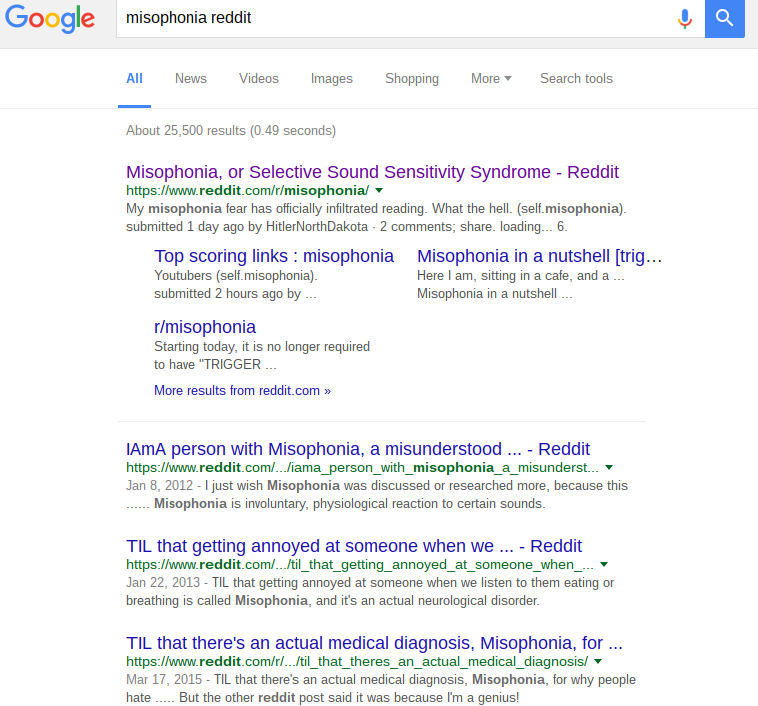Annoyances That Might Be Connected to Something Deeper

By:
We all get irritated from time to time, but certain pet peeves go beyond personal preferences and can stem from deeper mental health issues. Feeling seriously annoyed by the sound of chewing, for example, could indicate a real health condition facing many people.
Misophonia (which roughly translates to "hatred of sound") is a recently discovered health condition in which sounds can bring great distress and anger to an individual. A small study published in 2013 found that people with misophonia were most annoyed by eating sounds (i.e., lip smacking and swallowing), sneezing, nostril noises, breathing noises, and typing and clicking sounds.
While these noises could potentially bother anyone in a cramped room or a particularly uncomfortable circumstance, those with misophonia can have extreme reactions to the sounds. Some of the participants in the 2013 study, for example, even had physical reactions of anger to the sounds. The New York Times reported that one woman in the study expressed wanting to choke her boyfriend because of his chewing.
Though there isn't official diagnostic criteria for misophonia in the Diagnostic and Statistical Manual of Mental Disorders (DSM-5), more researchers and scientists have become familiar with it.
Marsha Johnson, an audiologist in Portland, Oregon, told The New York Times in 2011 that people with misophonia often face a lot of other mental health disorder diagnoses. She added that some people doubt the severity of this struggle and think victims could ignore the annoyances if they really wanted to.
“These people have been diagnosed with a lot of different things: phobic disorders, obsessive-compulsive disorder, bipolar, manic, anxiety disorders,” she told the publication, adding that she saw her first case of misophonia nearly twenty years ago. “This is not voluntary. Usually they cry a lot because they’ve been told they can control this if they want to. This is not their fault. They didn’t ask for it and they didn’t make it up."
Dr. Barron H. Lerner, a faculty member of the NYU Langone Medical Center, wrote about experiencing misophonia in the previously mentioned New York Times piece from last year.
"When I lived in New York City, I was much more sensitive than my roommates to noises from adjacent apartments. When dogs are left outside barking late at night, I fixate on the noise and cannot fall asleep. Chewing noises, particularly from behind me, are enormously irritating, as are people who perpetually sniff their mucus back into their nostrils rather than blowing their noses and ending the noise. Fortunately, I have not — at least so far — experienced nearly the rage of some of my fellow sufferers."
Many people with misophonia find solace through online support groups and forums, Dr. Lerner wrote. A simple Google search turns up a handful of Reddit threads for people who want to talk about having misophonia:

There are other things that may seem like everyday annoyances to some, but are actually more indicative of a mental health issue: agoraphobia is one of those.
The Mayo Clinic describes agoraphobia as a "type of anxiety disorder in which you fear and often avoid places or situations that might cause you to panic and make you feel trapped, helpless, or embarrassed."
In 2014, the National Health Service of the U.K. wrote about a then-26-year-old woman named Claire Ledger who had regularly had panic attacks during outings. This ultimately led her to quit her job and stop leaving her home.
“Every time I went out after that I got this feeling again,” she said. “Everywhere it happened, I avoided that place. Instead of thinking it was me, I associated the panic attack with the place where it happened. I was such an outgoing person, that the idea it was all in my head never occurred to me.”
Author and comedian Sara Benincasa wrote a 2012 book "Agorafabulous!: Dispatches From My Bedroom" about her experience with agoraphobia and panic attacks. She made the video below to explain the panic attacks:
